International Relations: Neo-Realism, Neo-Liberalism, and Cooperation
VerifiedAdded on 2023/06/07
|9
|2394
|78
Essay
AI Summary
This essay critically analyzes and compares the Neo-Realist and Neo-Liberal theories of International Relations, focusing on their differing perspectives on international cooperation. The essay begins by introducing the fundamental concepts of international relations, emphasizing the interplay of power dynamics, economic strength, and the influence of various factors on state relations. It then delves into the core tenets of Neo-Realism, also known as Structural Realism, which prioritizes power acquisition and security in an anarchic international system, examining the roles of offensive and defensive realists. The essay contrasts this with Neo-Liberalism, highlighting its emphasis on interdependence, shared values, economic cooperation, and the potential for international institutions to foster peace and stability. The discussion covers the role of military power, economic factors, and the varying approaches of each theory in mitigating the anarchic nature of the international system. The essay concludes by summarizing the key differences between the two theories and recognizing that both offer valuable insights into understanding the complexities of international relations and the pursuit of global cooperation and stability.
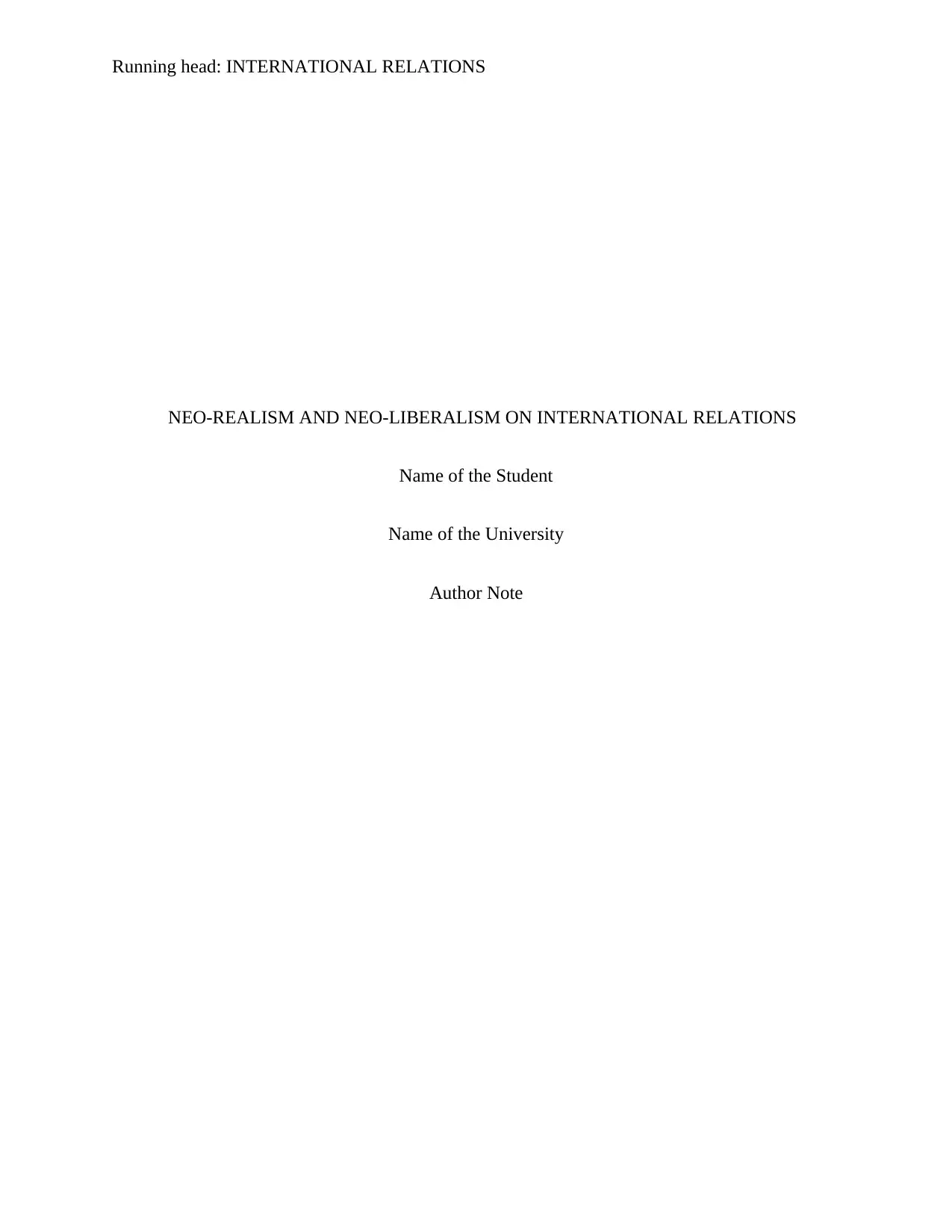
Running head: INTERNATIONAL RELATIONS
NEO-REALISM AND NEO-LIBERALISM ON INTERNATIONAL RELATIONS
Name of the Student
Name of the University
Author Note
NEO-REALISM AND NEO-LIBERALISM ON INTERNATIONAL RELATIONS
Name of the Student
Name of the University
Author Note
Paraphrase This Document
Need a fresh take? Get an instant paraphrase of this document with our AI Paraphraser
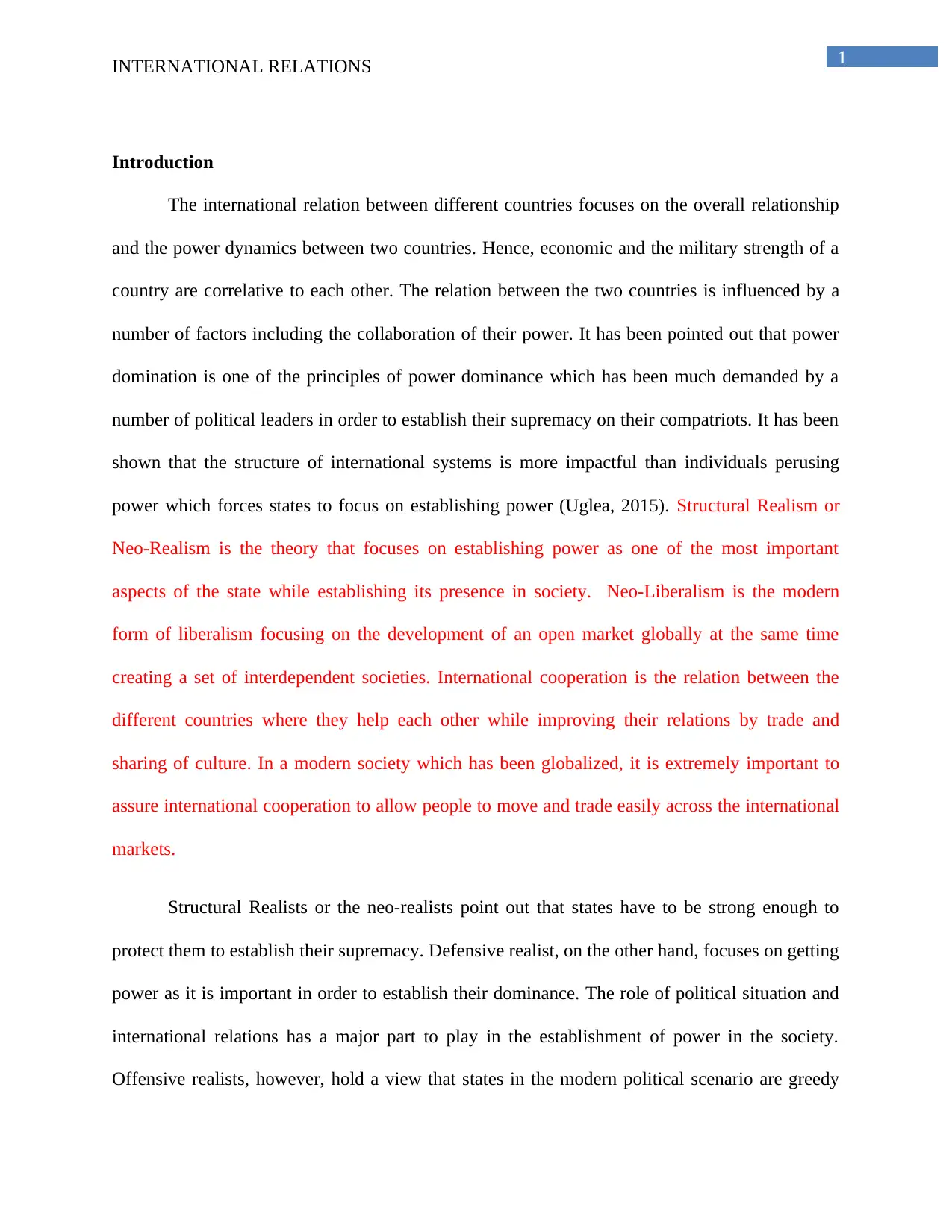
1INTERNATIONAL RELATIONS
Introduction
The international relation between different countries focuses on the overall relationship
and the power dynamics between two countries. Hence, economic and the military strength of a
country are correlative to each other. The relation between the two countries is influenced by a
number of factors including the collaboration of their power. It has been pointed out that power
domination is one of the principles of power dominance which has been much demanded by a
number of political leaders in order to establish their supremacy on their compatriots. It has been
shown that the structure of international systems is more impactful than individuals perusing
power which forces states to focus on establishing power (Uglea, 2015). Structural Realism or
Neo-Realism is the theory that focuses on establishing power as one of the most important
aspects of the state while establishing its presence in society. Neo-Liberalism is the modern
form of liberalism focusing on the development of an open market globally at the same time
creating a set of interdependent societies. International cooperation is the relation between the
different countries where they help each other while improving their relations by trade and
sharing of culture. In a modern society which has been globalized, it is extremely important to
assure international cooperation to allow people to move and trade easily across the international
markets.
Structural Realists or the neo-realists point out that states have to be strong enough to
protect them to establish their supremacy. Defensive realist, on the other hand, focuses on getting
power as it is important in order to establish their dominance. The role of political situation and
international relations has a major part to play in the establishment of power in the society.
Offensive realists, however, hold a view that states in the modern political scenario are greedy
Introduction
The international relation between different countries focuses on the overall relationship
and the power dynamics between two countries. Hence, economic and the military strength of a
country are correlative to each other. The relation between the two countries is influenced by a
number of factors including the collaboration of their power. It has been pointed out that power
domination is one of the principles of power dominance which has been much demanded by a
number of political leaders in order to establish their supremacy on their compatriots. It has been
shown that the structure of international systems is more impactful than individuals perusing
power which forces states to focus on establishing power (Uglea, 2015). Structural Realism or
Neo-Realism is the theory that focuses on establishing power as one of the most important
aspects of the state while establishing its presence in society. Neo-Liberalism is the modern
form of liberalism focusing on the development of an open market globally at the same time
creating a set of interdependent societies. International cooperation is the relation between the
different countries where they help each other while improving their relations by trade and
sharing of culture. In a modern society which has been globalized, it is extremely important to
assure international cooperation to allow people to move and trade easily across the international
markets.
Structural Realists or the neo-realists point out that states have to be strong enough to
protect them to establish their supremacy. Defensive realist, on the other hand, focuses on getting
power as it is important in order to establish their dominance. The role of political situation and
international relations has a major part to play in the establishment of power in the society.
Offensive realists, however, hold a view that states in the modern political scenario are greedy
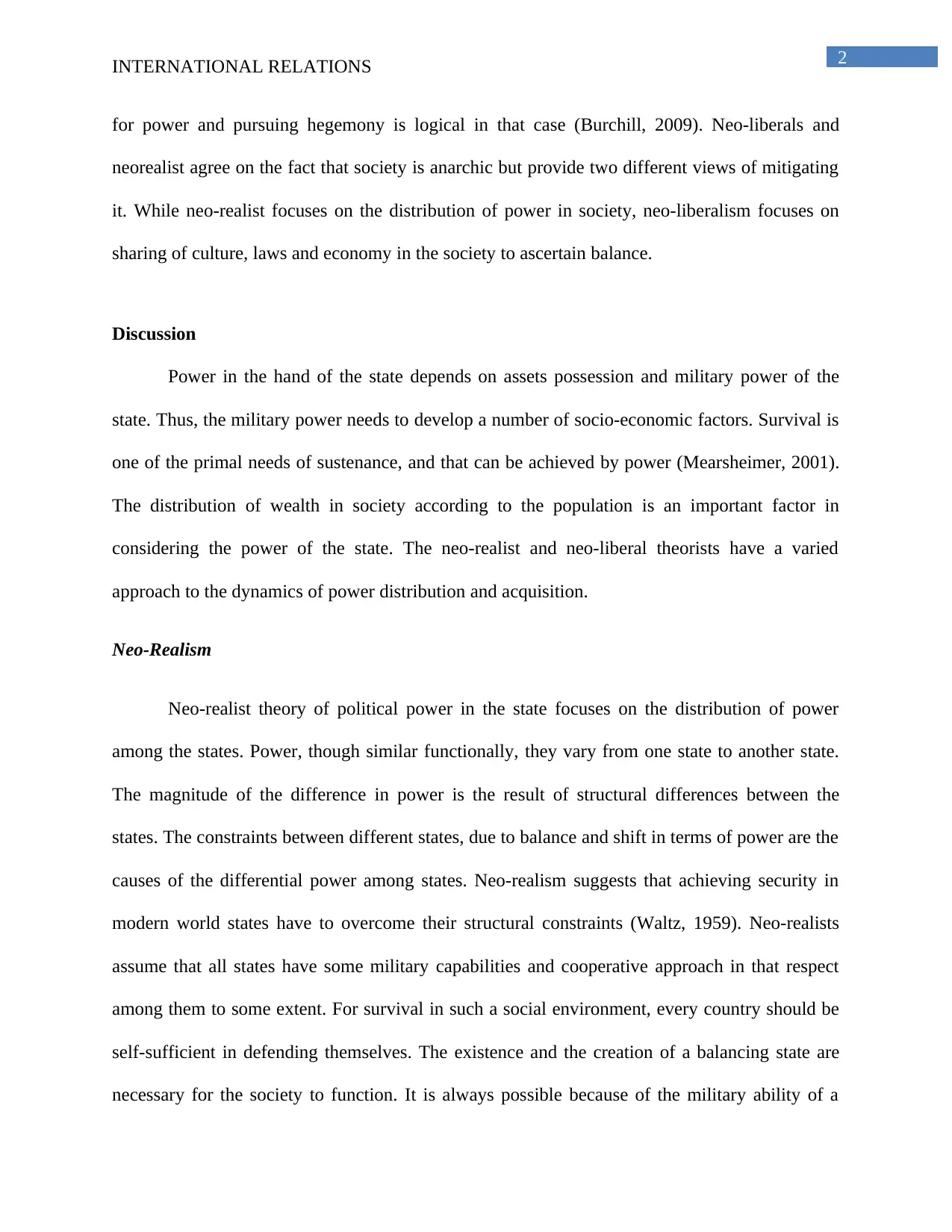
2INTERNATIONAL RELATIONS
for power and pursuing hegemony is logical in that case (Burchill, 2009). Neo-liberals and
neorealist agree on the fact that society is anarchic but provide two different views of mitigating
it. While neo-realist focuses on the distribution of power in society, neo-liberalism focuses on
sharing of culture, laws and economy in the society to ascertain balance.
Discussion
Power in the hand of the state depends on assets possession and military power of the
state. Thus, the military power needs to develop a number of socio-economic factors. Survival is
one of the primal needs of sustenance, and that can be achieved by power (Mearsheimer, 2001).
The distribution of wealth in society according to the population is an important factor in
considering the power of the state. The neo-realist and neo-liberal theorists have a varied
approach to the dynamics of power distribution and acquisition.
Neo-Realism
Neo-realist theory of political power in the state focuses on the distribution of power
among the states. Power, though similar functionally, they vary from one state to another state.
The magnitude of the difference in power is the result of structural differences between the
states. The constraints between different states, due to balance and shift in terms of power are the
causes of the differential power among states. Neo-realism suggests that achieving security in
modern world states have to overcome their structural constraints (Waltz, 1959). Neo-realists
assume that all states have some military capabilities and cooperative approach in that respect
among them to some extent. For survival in such a social environment, every country should be
self-sufficient in defending themselves. The existence and the creation of a balancing state are
necessary for the society to function. It is always possible because of the military ability of a
for power and pursuing hegemony is logical in that case (Burchill, 2009). Neo-liberals and
neorealist agree on the fact that society is anarchic but provide two different views of mitigating
it. While neo-realist focuses on the distribution of power in society, neo-liberalism focuses on
sharing of culture, laws and economy in the society to ascertain balance.
Discussion
Power in the hand of the state depends on assets possession and military power of the
state. Thus, the military power needs to develop a number of socio-economic factors. Survival is
one of the primal needs of sustenance, and that can be achieved by power (Mearsheimer, 2001).
The distribution of wealth in society according to the population is an important factor in
considering the power of the state. The neo-realist and neo-liberal theorists have a varied
approach to the dynamics of power distribution and acquisition.
Neo-Realism
Neo-realist theory of political power in the state focuses on the distribution of power
among the states. Power, though similar functionally, they vary from one state to another state.
The magnitude of the difference in power is the result of structural differences between the
states. The constraints between different states, due to balance and shift in terms of power are the
causes of the differential power among states. Neo-realism suggests that achieving security in
modern world states have to overcome their structural constraints (Waltz, 1959). Neo-realists
assume that all states have some military capabilities and cooperative approach in that respect
among them to some extent. For survival in such a social environment, every country should be
self-sufficient in defending themselves. The existence and the creation of a balancing state are
necessary for the society to function. It is always possible because of the military ability of a
⊘ This is a preview!⊘
Do you want full access?
Subscribe today to unlock all pages.

Trusted by 1+ million students worldwide
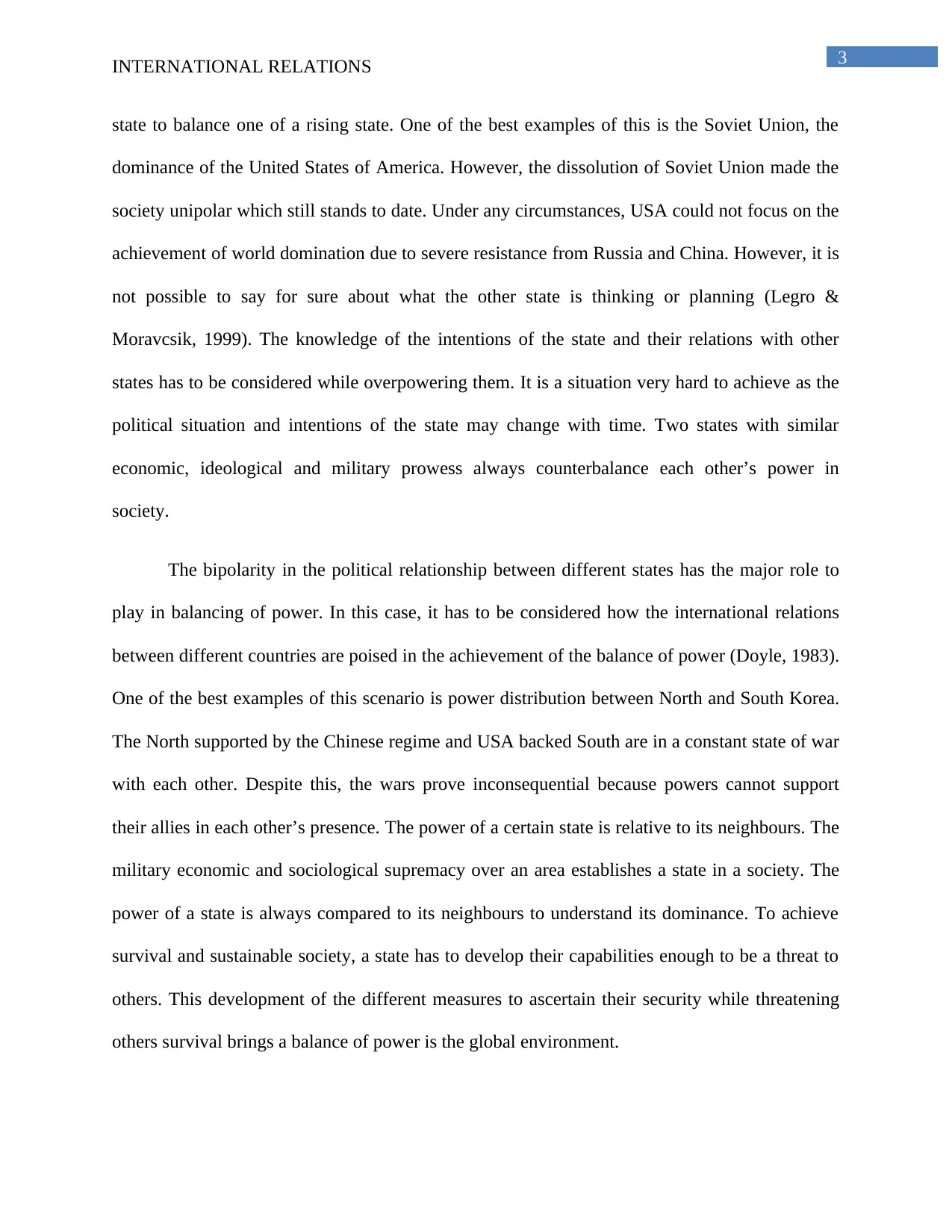
3INTERNATIONAL RELATIONS
state to balance one of a rising state. One of the best examples of this is the Soviet Union, the
dominance of the United States of America. However, the dissolution of Soviet Union made the
society unipolar which still stands to date. Under any circumstances, USA could not focus on the
achievement of world domination due to severe resistance from Russia and China. However, it is
not possible to say for sure about what the other state is thinking or planning (Legro &
Moravcsik, 1999). The knowledge of the intentions of the state and their relations with other
states has to be considered while overpowering them. It is a situation very hard to achieve as the
political situation and intentions of the state may change with time. Two states with similar
economic, ideological and military prowess always counterbalance each other’s power in
society.
The bipolarity in the political relationship between different states has the major role to
play in balancing of power. In this case, it has to be considered how the international relations
between different countries are poised in the achievement of the balance of power (Doyle, 1983).
One of the best examples of this scenario is power distribution between North and South Korea.
The North supported by the Chinese regime and USA backed South are in a constant state of war
with each other. Despite this, the wars prove inconsequential because powers cannot support
their allies in each other’s presence. The power of a certain state is relative to its neighbours. The
military economic and sociological supremacy over an area establishes a state in a society. The
power of a state is always compared to its neighbours to understand its dominance. To achieve
survival and sustainable society, a state has to develop their capabilities enough to be a threat to
others. This development of the different measures to ascertain their security while threatening
others survival brings a balance of power is the global environment.
state to balance one of a rising state. One of the best examples of this is the Soviet Union, the
dominance of the United States of America. However, the dissolution of Soviet Union made the
society unipolar which still stands to date. Under any circumstances, USA could not focus on the
achievement of world domination due to severe resistance from Russia and China. However, it is
not possible to say for sure about what the other state is thinking or planning (Legro &
Moravcsik, 1999). The knowledge of the intentions of the state and their relations with other
states has to be considered while overpowering them. It is a situation very hard to achieve as the
political situation and intentions of the state may change with time. Two states with similar
economic, ideological and military prowess always counterbalance each other’s power in
society.
The bipolarity in the political relationship between different states has the major role to
play in balancing of power. In this case, it has to be considered how the international relations
between different countries are poised in the achievement of the balance of power (Doyle, 1983).
One of the best examples of this scenario is power distribution between North and South Korea.
The North supported by the Chinese regime and USA backed South are in a constant state of war
with each other. Despite this, the wars prove inconsequential because powers cannot support
their allies in each other’s presence. The power of a certain state is relative to its neighbours. The
military economic and sociological supremacy over an area establishes a state in a society. The
power of a state is always compared to its neighbours to understand its dominance. To achieve
survival and sustainable society, a state has to develop their capabilities enough to be a threat to
others. This development of the different measures to ascertain their security while threatening
others survival brings a balance of power is the global environment.
Paraphrase This Document
Need a fresh take? Get an instant paraphrase of this document with our AI Paraphraser
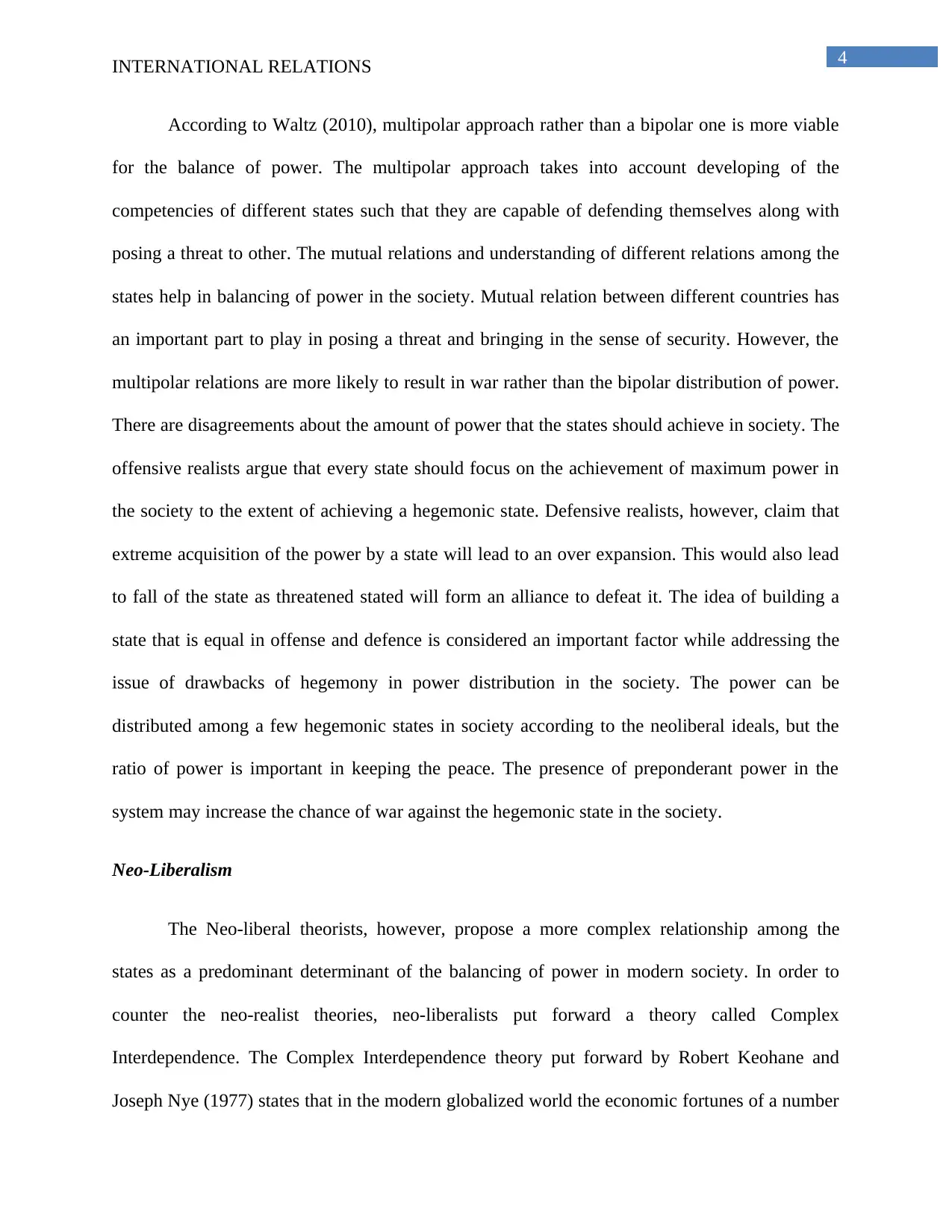
4INTERNATIONAL RELATIONS
According to Waltz (2010), multipolar approach rather than a bipolar one is more viable
for the balance of power. The multipolar approach takes into account developing of the
competencies of different states such that they are capable of defending themselves along with
posing a threat to other. The mutual relations and understanding of different relations among the
states help in balancing of power in the society. Mutual relation between different countries has
an important part to play in posing a threat and bringing in the sense of security. However, the
multipolar relations are more likely to result in war rather than the bipolar distribution of power.
There are disagreements about the amount of power that the states should achieve in society. The
offensive realists argue that every state should focus on the achievement of maximum power in
the society to the extent of achieving a hegemonic state. Defensive realists, however, claim that
extreme acquisition of the power by a state will lead to an over expansion. This would also lead
to fall of the state as threatened stated will form an alliance to defeat it. The idea of building a
state that is equal in offense and defence is considered an important factor while addressing the
issue of drawbacks of hegemony in power distribution in the society. The power can be
distributed among a few hegemonic states in society according to the neoliberal ideals, but the
ratio of power is important in keeping the peace. The presence of preponderant power in the
system may increase the chance of war against the hegemonic state in the society.
Neo-Liberalism
The Neo-liberal theorists, however, propose a more complex relationship among the
states as a predominant determinant of the balancing of power in modern society. In order to
counter the neo-realist theories, neo-liberalists put forward a theory called Complex
Interdependence. The Complex Interdependence theory put forward by Robert Keohane and
Joseph Nye (1977) states that in the modern globalized world the economic fortunes of a number
According to Waltz (2010), multipolar approach rather than a bipolar one is more viable
for the balance of power. The multipolar approach takes into account developing of the
competencies of different states such that they are capable of defending themselves along with
posing a threat to other. The mutual relations and understanding of different relations among the
states help in balancing of power in the society. Mutual relation between different countries has
an important part to play in posing a threat and bringing in the sense of security. However, the
multipolar relations are more likely to result in war rather than the bipolar distribution of power.
There are disagreements about the amount of power that the states should achieve in society. The
offensive realists argue that every state should focus on the achievement of maximum power in
the society to the extent of achieving a hegemonic state. Defensive realists, however, claim that
extreme acquisition of the power by a state will lead to an over expansion. This would also lead
to fall of the state as threatened stated will form an alliance to defeat it. The idea of building a
state that is equal in offense and defence is considered an important factor while addressing the
issue of drawbacks of hegemony in power distribution in the society. The power can be
distributed among a few hegemonic states in society according to the neoliberal ideals, but the
ratio of power is important in keeping the peace. The presence of preponderant power in the
system may increase the chance of war against the hegemonic state in the society.
Neo-Liberalism
The Neo-liberal theorists, however, propose a more complex relationship among the
states as a predominant determinant of the balancing of power in modern society. In order to
counter the neo-realist theories, neo-liberalists put forward a theory called Complex
Interdependence. The Complex Interdependence theory put forward by Robert Keohane and
Joseph Nye (1977) states that in the modern globalized world the economic fortunes of a number
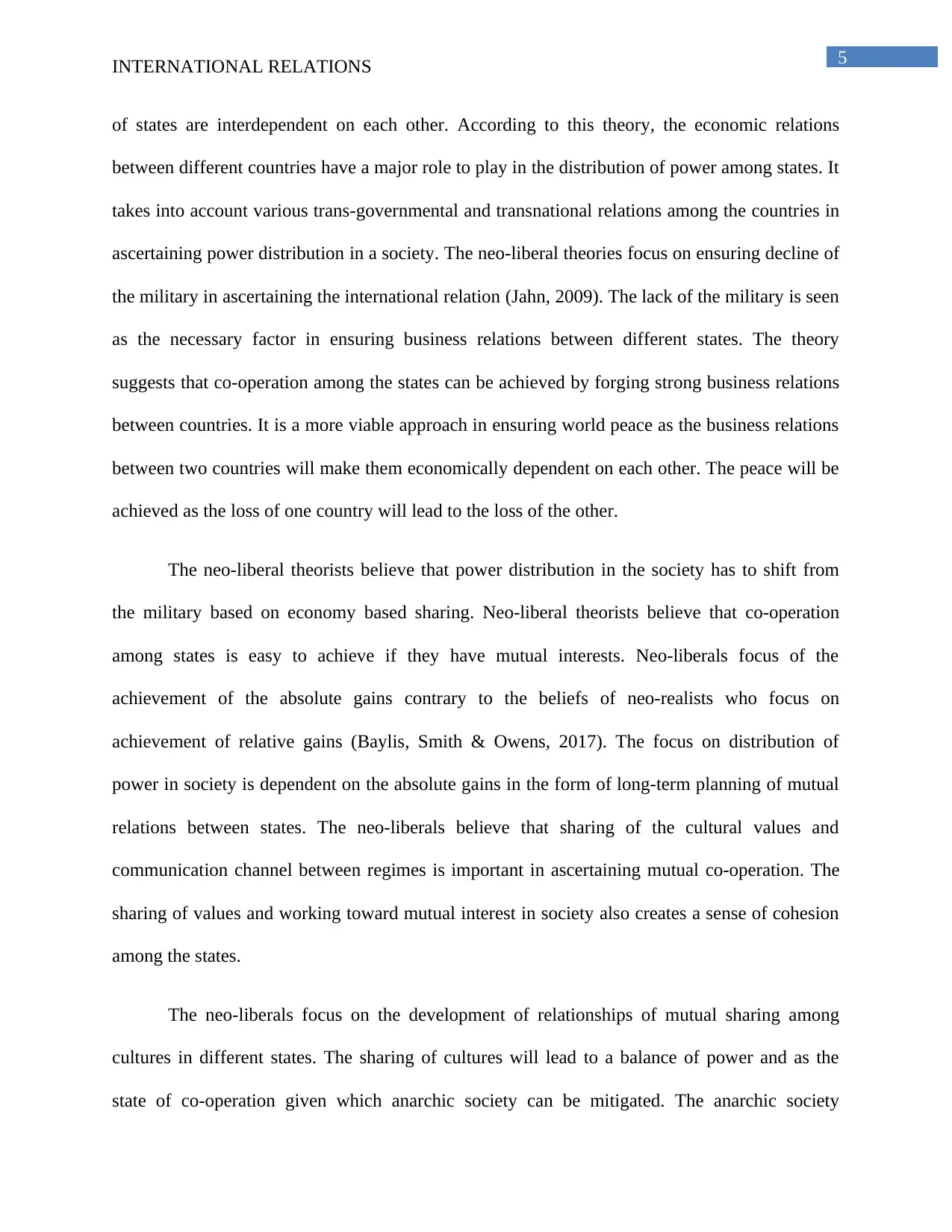
5INTERNATIONAL RELATIONS
of states are interdependent on each other. According to this theory, the economic relations
between different countries have a major role to play in the distribution of power among states. It
takes into account various trans-governmental and transnational relations among the countries in
ascertaining power distribution in a society. The neo-liberal theories focus on ensuring decline of
the military in ascertaining the international relation (Jahn, 2009). The lack of the military is seen
as the necessary factor in ensuring business relations between different states. The theory
suggests that co-operation among the states can be achieved by forging strong business relations
between countries. It is a more viable approach in ensuring world peace as the business relations
between two countries will make them economically dependent on each other. The peace will be
achieved as the loss of one country will lead to the loss of the other.
The neo-liberal theorists believe that power distribution in the society has to shift from
the military based on economy based sharing. Neo-liberal theorists believe that co-operation
among states is easy to achieve if they have mutual interests. Neo-liberals focus of the
achievement of the absolute gains contrary to the beliefs of neo-realists who focus on
achievement of relative gains (Baylis, Smith & Owens, 2017). The focus on distribution of
power in society is dependent on the absolute gains in the form of long-term planning of mutual
relations between states. The neo-liberals believe that sharing of the cultural values and
communication channel between regimes is important in ascertaining mutual co-operation. The
sharing of values and working toward mutual interest in society also creates a sense of cohesion
among the states.
The neo-liberals focus on the development of relationships of mutual sharing among
cultures in different states. The sharing of cultures will lead to a balance of power and as the
state of co-operation given which anarchic society can be mitigated. The anarchic society
of states are interdependent on each other. According to this theory, the economic relations
between different countries have a major role to play in the distribution of power among states. It
takes into account various trans-governmental and transnational relations among the countries in
ascertaining power distribution in a society. The neo-liberal theories focus on ensuring decline of
the military in ascertaining the international relation (Jahn, 2009). The lack of the military is seen
as the necessary factor in ensuring business relations between different states. The theory
suggests that co-operation among the states can be achieved by forging strong business relations
between countries. It is a more viable approach in ensuring world peace as the business relations
between two countries will make them economically dependent on each other. The peace will be
achieved as the loss of one country will lead to the loss of the other.
The neo-liberal theorists believe that power distribution in the society has to shift from
the military based on economy based sharing. Neo-liberal theorists believe that co-operation
among states is easy to achieve if they have mutual interests. Neo-liberals focus of the
achievement of the absolute gains contrary to the beliefs of neo-realists who focus on
achievement of relative gains (Baylis, Smith & Owens, 2017). The focus on distribution of
power in society is dependent on the absolute gains in the form of long-term planning of mutual
relations between states. The neo-liberals believe that sharing of the cultural values and
communication channel between regimes is important in ascertaining mutual co-operation. The
sharing of values and working toward mutual interest in society also creates a sense of cohesion
among the states.
The neo-liberals focus on the development of relationships of mutual sharing among
cultures in different states. The sharing of cultures will lead to a balance of power and as the
state of co-operation given which anarchic society can be mitigated. The anarchic society
⊘ This is a preview!⊘
Do you want full access?
Subscribe today to unlock all pages.

Trusted by 1+ million students worldwide
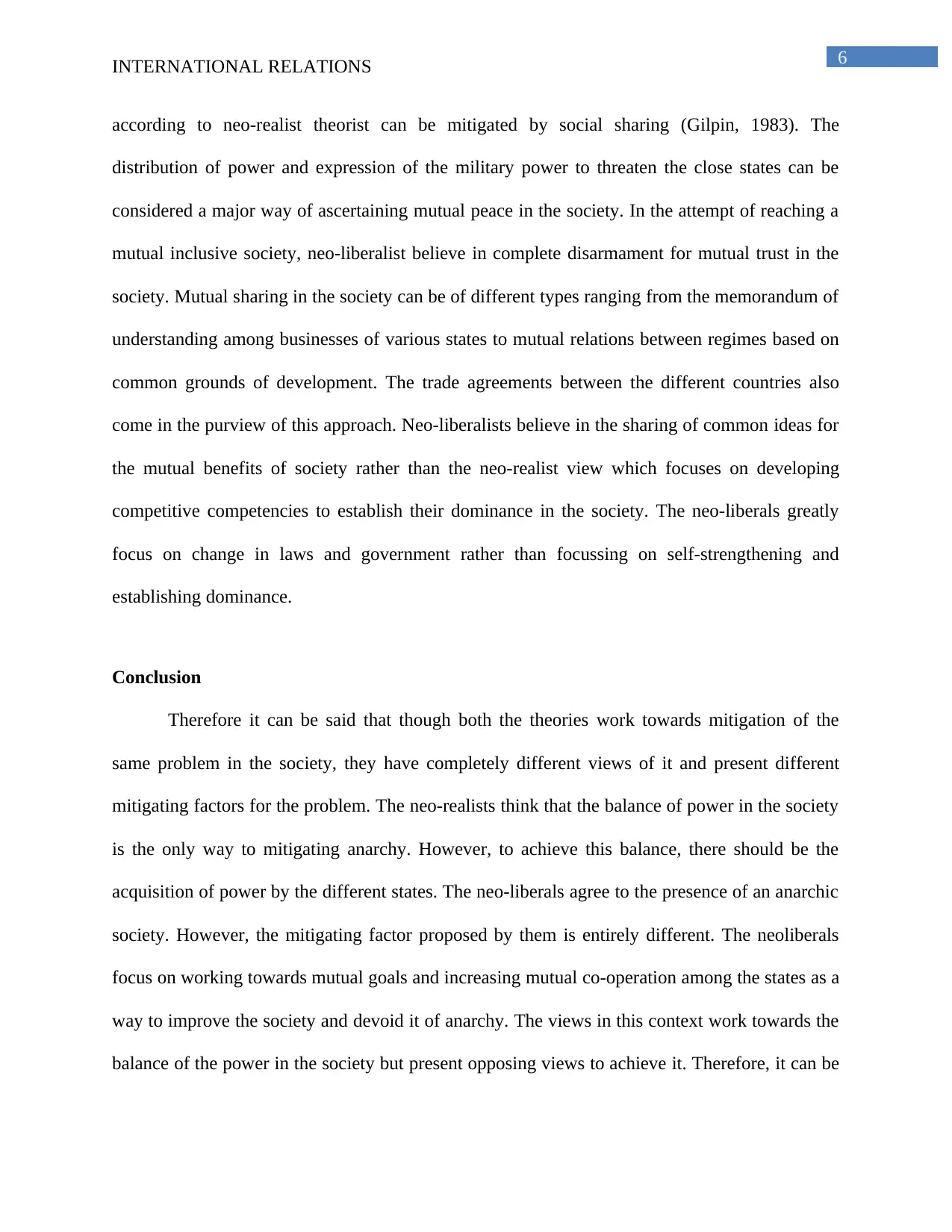
6INTERNATIONAL RELATIONS
according to neo-realist theorist can be mitigated by social sharing (Gilpin, 1983). The
distribution of power and expression of the military power to threaten the close states can be
considered a major way of ascertaining mutual peace in the society. In the attempt of reaching a
mutual inclusive society, neo-liberalist believe in complete disarmament for mutual trust in the
society. Mutual sharing in the society can be of different types ranging from the memorandum of
understanding among businesses of various states to mutual relations between regimes based on
common grounds of development. The trade agreements between the different countries also
come in the purview of this approach. Neo-liberalists believe in the sharing of common ideas for
the mutual benefits of society rather than the neo-realist view which focuses on developing
competitive competencies to establish their dominance in the society. The neo-liberals greatly
focus on change in laws and government rather than focussing on self-strengthening and
establishing dominance.
Conclusion
Therefore it can be said that though both the theories work towards mitigation of the
same problem in the society, they have completely different views of it and present different
mitigating factors for the problem. The neo-realists think that the balance of power in the society
is the only way to mitigating anarchy. However, to achieve this balance, there should be the
acquisition of power by the different states. The neo-liberals agree to the presence of an anarchic
society. However, the mitigating factor proposed by them is entirely different. The neoliberals
focus on working towards mutual goals and increasing mutual co-operation among the states as a
way to improve the society and devoid it of anarchy. The views in this context work towards the
balance of the power in the society but present opposing views to achieve it. Therefore, it can be
according to neo-realist theorist can be mitigated by social sharing (Gilpin, 1983). The
distribution of power and expression of the military power to threaten the close states can be
considered a major way of ascertaining mutual peace in the society. In the attempt of reaching a
mutual inclusive society, neo-liberalist believe in complete disarmament for mutual trust in the
society. Mutual sharing in the society can be of different types ranging from the memorandum of
understanding among businesses of various states to mutual relations between regimes based on
common grounds of development. The trade agreements between the different countries also
come in the purview of this approach. Neo-liberalists believe in the sharing of common ideas for
the mutual benefits of society rather than the neo-realist view which focuses on developing
competitive competencies to establish their dominance in the society. The neo-liberals greatly
focus on change in laws and government rather than focussing on self-strengthening and
establishing dominance.
Conclusion
Therefore it can be said that though both the theories work towards mitigation of the
same problem in the society, they have completely different views of it and present different
mitigating factors for the problem. The neo-realists think that the balance of power in the society
is the only way to mitigating anarchy. However, to achieve this balance, there should be the
acquisition of power by the different states. The neo-liberals agree to the presence of an anarchic
society. However, the mitigating factor proposed by them is entirely different. The neoliberals
focus on working towards mutual goals and increasing mutual co-operation among the states as a
way to improve the society and devoid it of anarchy. The views in this context work towards the
balance of the power in the society but present opposing views to achieve it. Therefore, it can be
Paraphrase This Document
Need a fresh take? Get an instant paraphrase of this document with our AI Paraphraser
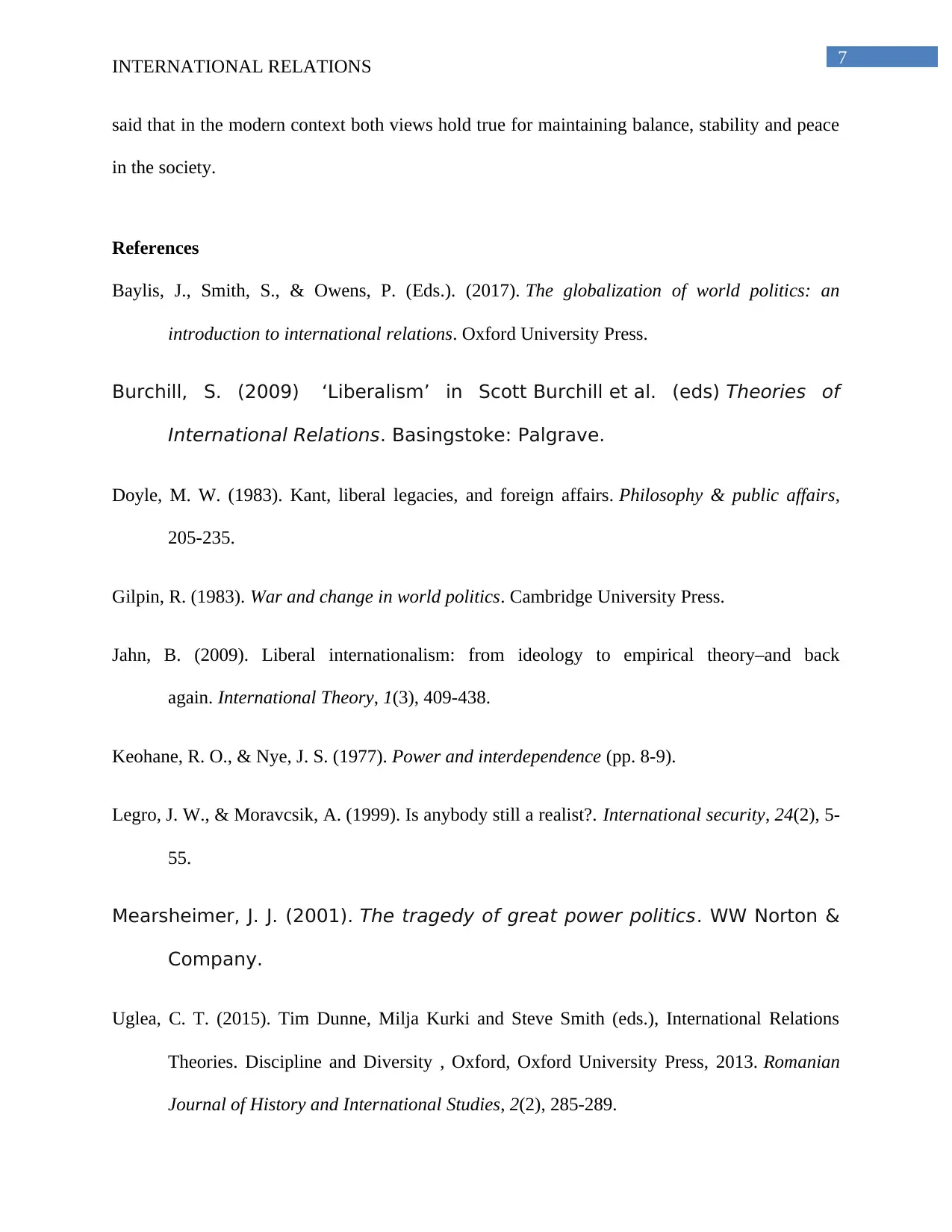
7INTERNATIONAL RELATIONS
said that in the modern context both views hold true for maintaining balance, stability and peace
in the society.
References
Baylis, J., Smith, S., & Owens, P. (Eds.). (2017). The globalization of world politics: an
introduction to international relations. Oxford University Press.
Burchill, S. (2009) ‘Liberalism’ in Scott Burchill et al. (eds) Theories of
International Relations. Basingstoke: Palgrave.
Doyle, M. W. (1983). Kant, liberal legacies, and foreign affairs. Philosophy & public affairs,
205-235.
Gilpin, R. (1983). War and change in world politics. Cambridge University Press.
Jahn, B. (2009). Liberal internationalism: from ideology to empirical theory–and back
again. International Theory, 1(3), 409-438.
Keohane, R. O., & Nye, J. S. (1977). Power and interdependence (pp. 8-9).
Legro, J. W., & Moravcsik, A. (1999). Is anybody still a realist?. International security, 24(2), 5-
55.
Mearsheimer, J. J. (2001). The tragedy of great power politics. WW Norton &
Company.
Uglea, C. T. (2015). Tim Dunne, Milja Kurki and Steve Smith (eds.), International Relations
Theories. Discipline and Diversity , Oxford, Oxford University Press, 2013. Romanian
Journal of History and International Studies, 2(2), 285-289.
said that in the modern context both views hold true for maintaining balance, stability and peace
in the society.
References
Baylis, J., Smith, S., & Owens, P. (Eds.). (2017). The globalization of world politics: an
introduction to international relations. Oxford University Press.
Burchill, S. (2009) ‘Liberalism’ in Scott Burchill et al. (eds) Theories of
International Relations. Basingstoke: Palgrave.
Doyle, M. W. (1983). Kant, liberal legacies, and foreign affairs. Philosophy & public affairs,
205-235.
Gilpin, R. (1983). War and change in world politics. Cambridge University Press.
Jahn, B. (2009). Liberal internationalism: from ideology to empirical theory–and back
again. International Theory, 1(3), 409-438.
Keohane, R. O., & Nye, J. S. (1977). Power and interdependence (pp. 8-9).
Legro, J. W., & Moravcsik, A. (1999). Is anybody still a realist?. International security, 24(2), 5-
55.
Mearsheimer, J. J. (2001). The tragedy of great power politics. WW Norton &
Company.
Uglea, C. T. (2015). Tim Dunne, Milja Kurki and Steve Smith (eds.), International Relations
Theories. Discipline and Diversity , Oxford, Oxford University Press, 2013. Romanian
Journal of History and International Studies, 2(2), 285-289.
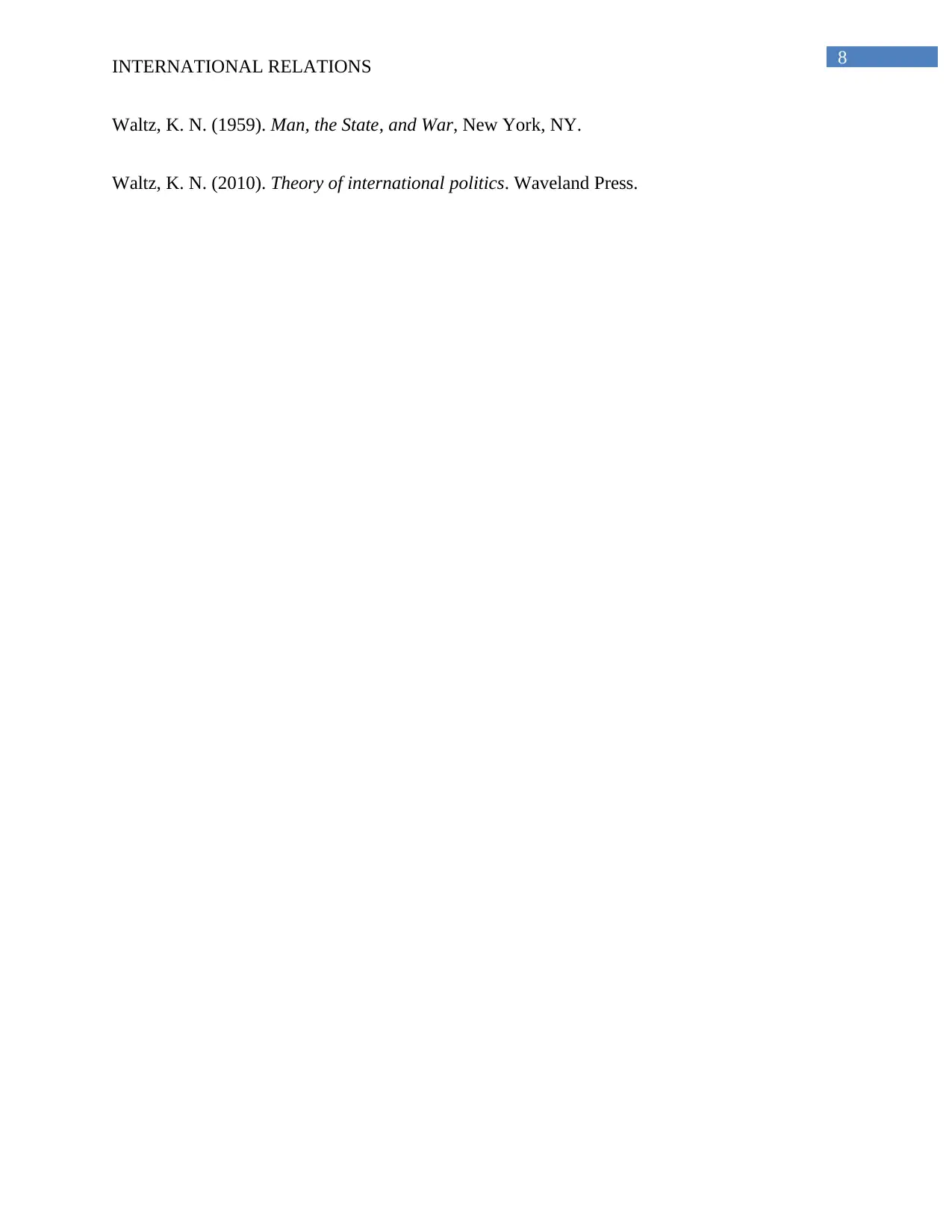
8INTERNATIONAL RELATIONS
Waltz, K. N. (1959). Man, the State, and War, New York, NY.
Waltz, K. N. (2010). Theory of international politics. Waveland Press.
Waltz, K. N. (1959). Man, the State, and War, New York, NY.
Waltz, K. N. (2010). Theory of international politics. Waveland Press.
⊘ This is a preview!⊘
Do you want full access?
Subscribe today to unlock all pages.

Trusted by 1+ million students worldwide
1 out of 9
Related Documents
Your All-in-One AI-Powered Toolkit for Academic Success.
+13062052269
info@desklib.com
Available 24*7 on WhatsApp / Email
![[object Object]](/_next/static/media/star-bottom.7253800d.svg)
Unlock your academic potential
Copyright © 2020–2026 A2Z Services. All Rights Reserved. Developed and managed by ZUCOL.





